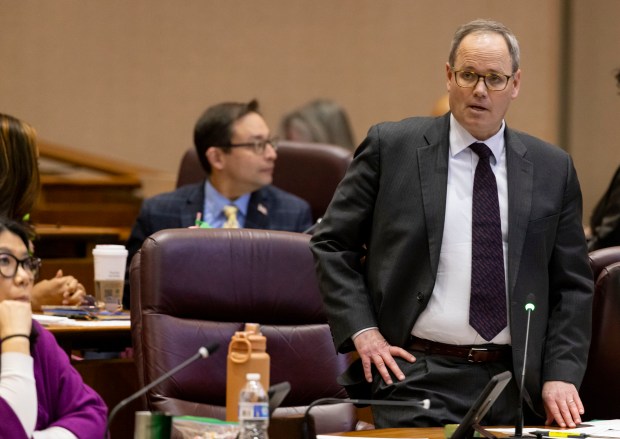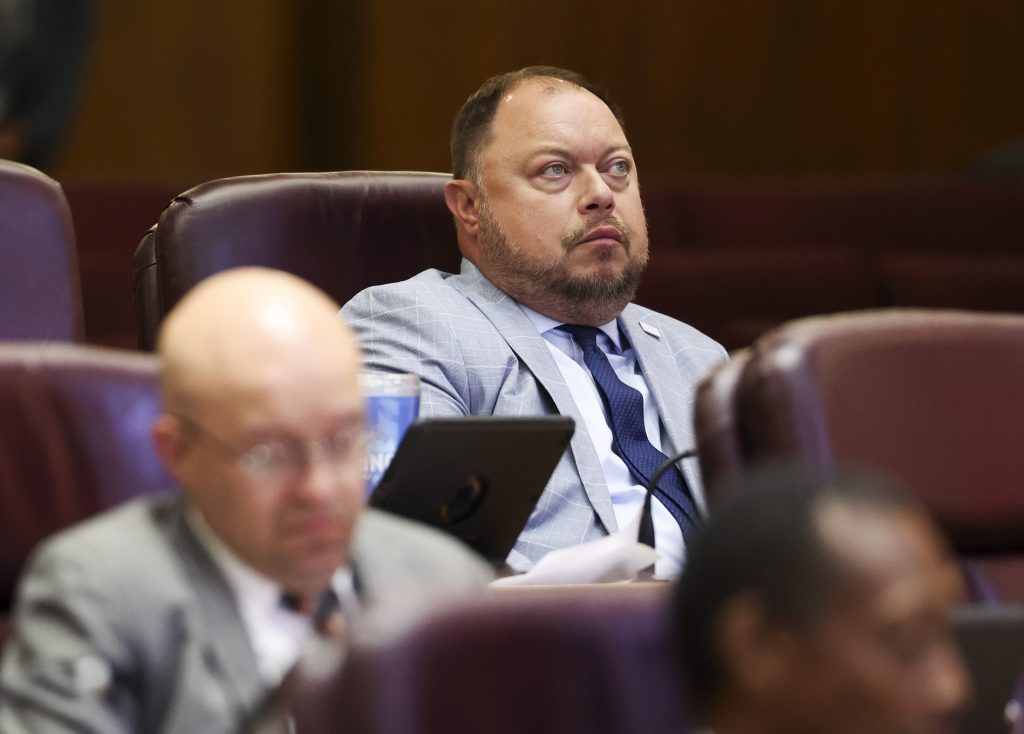Aldermen reached an apparent deal Tuesday to legalize coach houses, basement units and “granny flats” in Chicago, but slow their spread in single-family neighborhoods.
Alds. Marty Quinn and Bennett Lawson had sparred for nearly a year over the “additional dwelling unit” legislation. But the compromise they announced is poised to clear the way for some Chicago homeowners to soon add units in their buildings and over their garages.
In a hard-fought win for Quinn, the latest version does less to allow homeowners in areas with single-family homes to easily build the apartments than an earlier version supported by Mayor Brandon Johnson. But with dueling sides on board, it appears likely to pass Thursday in the City Council.
“We are a city of 77 neighborhoods, and it’s not a one-size-fits-all,” Quinn, 13th, said Tuesday.
Lawson, 44th, backed by Johnson, wanted the units to be allowed without aldermanic input across the entire city, from the dense lakefront environs of his Lincoln Park ward to the “Bungalow Belt” composed primarily of single-family homes on the city’s outskirts.
Quinn led a dogged and ultimately successful opposition to Lawson’s proposal. He insisted aldermen be able to block the units in their own wards and argued that allowing them “by right” would ultimately flood areas like his Southwest Side ward with more people, stretching area resources and warping neighborhood character.
Lawson proposed limiting the number of units that could be built on a block in such residential areas to one, two or three per year. His limits appeared poised to pass in July until Quinn and Ald. Greg Mitchell, 7th, used a legislative maneuver to delay the vote for months.
But Quinn regained the upper hand earlier in September when he won the support of organized labor — including a host of trade unions, the Chicago Federation of Labor and even the Johnson-aligned Service Employees International Union Local 1 — by proposing a requirement for coach house construction to use workers from apprenticeship programs, many of which are operated by unions.
His ordinance will give aldermen in single-family areas the choice to opt in to allow the additional units or continue to ban them, a key component likely to block the units in many parts of the city. The units have been banned citywide since 1957, though several hundred have been built since the 2021 launch of a legalization pilot program.
The red meat to powerful unions with big sway over the City Council appeared to give Quinn much of what he wanted in the compromise.
He described the deal he struck to win union support as a leg-up for the “scores of trade workers” in his ward and brushed aside the question when asked if apprenticeship programs would make construction more expensive and slower as Chicago struggles through a housing crisis.
“That’s the fastest way to the middle class,” Quinn said. “They will be built safely, utilizing skilled work.”
 Ald. Marty Quinn, 13th, speaks during a City Council meeting on Jan. 15, 2025, at City Hall. (Brian Cassella/Chicago Tribune)
Ald. Marty Quinn, 13th, speaks during a City Council meeting on Jan. 15, 2025, at City Hall. (Brian Cassella/Chicago Tribune)
Quinn said he will at first not allow the units to be built in his ward’s residential areas. He said he was unsure if the ordinance will allow aldermen to issue one-at-a-time permits as the city’s laws governing liquor stores do.
“I’m going to let this ordinance marinate and see if there are any residents that bring forth ideas. And we will take those on a case-by-case basis,” he said. “I’m always looking to preserve my community’s voice, make sure they have a front row seat at the table.”
Lawson touted the deal as a win at City Hall Tuesday as he declined to dwell on the parts of his proposal lost during negotiations. “This is a big expansion that I think will have a big impact,” he said.
The policy will allow for units to be added in parts of Chicago zoned for multi-unit housing, including the city’s arterial roads, he said. The compromise deal retained the generous sizing restrictions in his earlier proposal, and the units will now be legal in more single-family zones, he said.
“I feel really good about it, that we’re able to put the two ordinances together to listen to the concerns of everyone in this city,” he said.
Even though Johnson lost his push to allow homeowners to bypass aldermen when building, he praised the City Council for “not getting jammed up because of one individual’s perspective” during an unrelated Tuesday news conference. The new deal is a step toward his goal of “creating as many opportunities as possible to build more affordable units,” he said.
“We’re on pace to build 10,000 affordable units. We need 100,000,” Johnson said. “That’s what we are accomplishing, and we’re going to do that with as much expediency as we possibly can.”
Also Tuesday, the Zoning Committee approved construction of a 22,000-seat Chicago Fire soccer stadium in the South Loop as expected, sending the plan to the full City Council.
Tribune reporter Alice Yin contributed.
Originally Published: September 23, 2025 at 1:13 PM CDT
